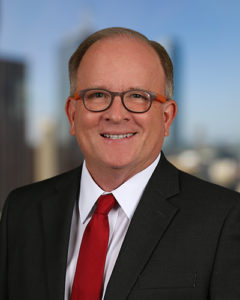By Mike Rosa, Senior Vice President of Economic Development
During the first couple years of my tenure at the Dallas Regional Chamber, which started in 2004, we hosted project teams considering where to locate significant biotechnology facilities for Genentech and Novartis.

Both times, we pulled out all the stops. We hosted tours and meetings with some brilliant scientists at UT Southwestern Medical Center’s campus, arranged interviews with biotechnology employers, and met with other regional colleges and universities to discuss programs and partnerships.
We also pitched our wrap-around advantages. We highlighted our central location, superior transportation networks and infrastructure, and our large population and labor force. We provided statistics on how many workers in the Dallas Region were in similar industries to biotech and could easily transfer with training. We touted our major health care systems that could support clinical trials. We had great real estate options.
We knew we had an advantage with low taxes and costs. To sweeten the pitch, we laid out incentives into the tens of millions of dollars.
Neither landed here. The project teams loved all we pitched and appreciated our shining stars like UT Southwestern, but other locations were more established, more clustered in biotech, and seen as less risky for these major investments.
Years later, DFW is a rising star in biotech. Historically unranked as a biotech location, DFW is now showing up on merit. CBRE, with objective and detailed analysis, ranked DFW 6th as an emerging life science cluster in 2020. Commercial Edge, a research and services firm, has DFW 16th among 45 U.S. metros as a location for life sciences in a 2022 study. And CBRE’s 2022 scoring puts DFW 16th in the nation for biotech, barely behind Atlanta and Houston and ahead of Austin.
We’re accustomed to seeing DFW ranked at or near the top of most measures — not 16th or 6th — but from where we’ve come, it’s something to celebrate and build upon.
What’s the difference? To complement our longstanding shining stars, we’ve got additions to our bid.
One I’ve already mentioned. We are showing up in the rankings and in the data. It matters. Company leaders and location advisors pay attention when they start seeing cities and metro areas show up consistently. It results in more opportunities and more looks for us.
DFW International Airport has a new 37,000-square-foot cold chain storage facility that makes it easy for time-sensitive therapies and pharmaceuticals to be made and shipped from here to waiting patients.
Pegasus Park, just north of downtown Dallas and near UT Southwestern, is a new place that biotech is clustering. BioLabs, an industry leader in providing space and services to incubate and accelerate biotech, is there. It’s the first BioLabs location not on either coast. Already, companies there have won funding and one, Aakha Biologics, has now graduated to permanent space in Frisco.
We have more important companies here in biotech than ever before. This includes McKesson’s global headquarters, Taysha Gene Therapies, Caris Life Sciences, Verily, and Evolve Biologics.
UT Southwestern has partnered with UT Dallas, with support from Texas Instruments, to build a new bioengineering building. Also, at UT Southwestern, the O’Donnell Brain Institute’s research is positioning our region to be a global leader in an emerging and significant sector.
Dallas College — in partnership with several other higher ed institutions and biomedical businesses — received an $8.8 million grant from the U.S. Economic Development Administration that will fuel the Dallas Region’s biotech boom. UT Southwestern, McKesson, Evolve Biologics, and Texas Health Resources are set to hire 1,100 biotech workers from this groundbreaking program.
All these things are happening at the perfect time.
But the clincher could be this: biotech itself is changing. Biotechnology is intersecting with big data, artificial intelligence, communications, virtual reality, and other sectors that are already robust in our region. Biotech companies will consider DFW superior to other regions for this reason, and an ideal place to be for biotechnology of the future.
Our pitch is so much stronger. The DRC team will be targeting companies that will find our new assets compelling. We’ll be visiting them, hosting them, and getting a lot of serious looks and some great new corporate locations. We’re building the future economy of our great region. How fun is that?